
This article is part six of a series of interviews from Sundance Film Festival chronicling the best of indie film for the upcoming year.
“Now Apocalypse. Shedding light onto the world of sexuality”
The sprightly Gregg Araki blurts the words out as I sit down next to him on the terrace of the Park City Marriott Summit Watch. Like so many filmmakers at the Sundance Film Festival, Araki and his co-writer Karley Sciortino have resorted to doing interviews in a discreet corner of a hotel. The three of us sit on a terrace overlooking the wood panelled lobby, enveloped by our overstuffed leather chairs.
The cult director of films like The Doom Generation, Nowhere, Kaboom and Mysterious Skin, Araki has spent a good chunk of his career promoting his films at festivals like Sundance across the globe. He returns to the festival this year’s with Now Apocalypse, his first foray into creating a television series.
How about we take this to the next level?
Our newsletter is like a refreshing cocktail (or mocktail) of LGBTQ+ entertainment and pop culture, served up with a side of eye-candy.
Set in Los Angeles, the show follows a group of sexually active 20 and 30-somethings as they navigate the peril and promise of urban life. A crisis begins when Ulysses (Avan Jogia) begins having frightening visions of alien rape and impending doom. Queerty favorite Tyler Hochlin also has a recurring role.
We caught up with Araki and Sciortino just ahead of the Sundance premiere of the show to chat about the show, Millennial sex, and Araki’s reasons for transitioning to TV.
Now Apocalypse comes to Starz March 10.
We are so excited about your new series! I guess we should start at the beginning…
GA: This is my ninth Sundance, I think. I was first here in 1992. I’ve been wanting to do this show for over 20 years. It’s very much the ultimate. I put everything into this show. If it’s the last thing I ever do, I’m going pour it all into this show. It’s such a crazy show. Hopefully, we’ll get Season 2. Season 1 was insane. I hope people’s minds are blown. Especially for people who know my work, they’ll recognize every idea, theme, actors, music, it’s all there.
All your recurring themes are there. Pretty people, obviously. Horny people. Fluid sexuality. Aliens. Drugs. Surrealism, and apocalypses. It almost feels like you’re rebooting the “Apocalypse Trilogy.”

GA: I call it a parody of a Gregg Araki movie.
[Laughter]
KS: That’s so funny.
GA: The idea to me, because it does very much have elements of Kaboom, Nowhere, things like that. I don’t think of it as a copy so much as a culmination. I’ve had this amazing, long career. I’ve had the opportunity to make so many movies and just follow my muse. But I find that there are elements of Mysterious Skin, especially Smiley Face, that actually turned out to be a big part of the show. Everything I’ve done is part of the show. It’s all part of my oeuvre. It’s all very embedded in the universe of the show. And also, because I met Karley like a year before we started, and we’re such kindred spirits. We think that sexuality is such an important part of your identity and growing up that you really reveal parts of yourself during a sexual encounter. You really learn about people. So that’s something we’re on the same wavelength about, even though she’s younger and of a different generation. That’s why I think we hit it off. So I brought Karley aboard to collaborate on this so we could really explore this world. But it’s so much a universe that is my brand.
Sure, totally.
GA: But it’s fun because Starz, you know, God bless them. Who knows what’s going to happen?
KS: To their credit.
GA: They literally just let my imagination run amok. They were like do whatever the Hell you want.
Fantastic.
GA: So it just unleashed 30 years of everything I’ve ever wanted to do. I literally thought would just be 10 episodes, so everything is kind of in those 10 episodes.
KS: There was a lot of—and maybe this is a reveal—but there was a lot of stuff where you’d be like for 20 years I’ve wanted to do this. It was like a dumping ground for all the sh*t you’ve ever wanted to do.

GA: Yeah. There are always these ideas that you’re like, Is this going to fade, is this too crazy? Which is why it’s so fun. The show itself is so fun. We have so many amazing people on the show, and we’re all like a family. All the actors, the crew is all my usual crew. It was just such a fun show. It was making a show with your friends.
That’s wonderful. So let’s talk about you, Karley. How did you get involved?
KS: I wrote a script maybe five years ago, a feature script that Gregg liked and was going to direct. It was the first script I ever wrote, and you were like, “This is really good, but structurally it doesn’t make any sense.”
[Laughter]
KS: “Can you change this?” So in a weird way, he was like my first screenwriting coach, because nobody had ever told me how to write a screenplay. Gregg basically explained to me what a story is, and finding your voice. So when he came up with the idea for Now Apocalypse, he called me.
GA: So we just wrote the script together. And Karley, I read her script. And she just has this really cool, new feminist, radical voice. It’s fun, it’s smart, sexy. So I met her not knowing what to expect. I just thought she’d be a crazy bitch. But we really hit it off. We’re very much kindred spirits in our views on sexuality. So we just have this rapport that feels so natural. When I came up with the idea for the show, I’d been working in TV for two or three years doing episodic stuff and learning a lot about how episodic works. And I look at showrunners, and running a show is so much work. It’s so f*cking exhausting. Showrunners are always about to collapse. And I decided that if I ever did a show, it would have to be 100% me. So I sat down and thought about what that show would be. I had met Karley, and I’d met Avan [Avan Jogia, who plays the lead, Uly]. And both Avan and Karley gave me hope for the Millennial generation. Because so many millennials are just so narcissistic.
Well, let’s talk about that. You mention that the two of you are of two different generations. How do you guys think you complement each other?
GA: I mean we just fit together. Our sensibilities fit together. We both think a lot about sex and sexuality. But the kernel, having met Karley and Avan, was their personalities when I was writing. And also, the rocket scientist character—Joseph Gordon-Levitt’s wife is a rocket scientist.
Really?
GA: And it’s so funny because she’s really hot. And when we met, he said, “This is my fiance, she’s a rocket scientist.” And I just thought that was so perfect. She’s a hot rocket scientist. So that’s kind of the germ of it. From there, I just thought it would be more fun and fresh—especially because I’m such a feminist—I really wanted to have a female perspective. So we wrote the show on spec. And I showed the script to Greg Jacobs, who’s partners with Steven Soderbergh, and literally, overnight we were going.
KS: I think really, with the generational thing, we have such a similar attitude toward sex. But it’s helpful that Greg came from this queer movement in the 90s, which I think, at the time, was very transgressive. And I’m part of a generation where there’s a new frontier for female sexual agency. We’ve really sort of embraced sluttiness and promiscuity. So while we have similar ideas about sexual identity and sexual adventure, I can’t write from the perspective of a queer dude as well as Gregg can. And I think it’s helpful that I am a woman with a variety of different sexual experiences to draw on.
Related: Gregg Araki Honored At P-Town Film Festival
GA: Yeah, it’s funny.
KS: We both draw on our sexual experiences.
GA: I was telling Greg that a lot of times we’ll come up with something, and I’ll just say to Karley, because she’s a sexpert, “Ok, they go to a sex party.” And I’ve never been to a sex party, but Karley has. So it’s like the first time you go to a sex party, what happens? So I’ll just hand that off to Karley. Then she comes back, and if I had written the scene, it would have been different, but it’s cool. And that was the fun aspect of the show for me: the surprises I would get.

So ok, so you take the script to Starz, which has a great, relaxed attitude when it comes to sexual content. They let a lot fly. But this is an extremely sexually charged series. It’s almost about exploring sexuality. So how did the network react?
GA: Starz was so great.
KS: Like he was saying, they were just like, “OK.”
GA: I’m used to going into places, meetings for movies or shows and it’s always like don’t worry, we’re going to keep the sexuality very discreet. We’re going to tone it down. And Starz is the opposite. They want more sex. They want nudity. It was the opposite of any meeting I’ve ever had. Thank God for Starz. They were just so open to us going crazy. And I think it’s really paid off for them because they have this show now which is really unlike any other show on TV.
KS: Remember when my boyfriend saw a couple episodes and said, “Wow, so like that was derivative of like literally nothing.” And that’s such a compliment.
That is a high compliment for TV where things tend to be a bit derivative. So you acknowledge that it does integrate a lot of your usual tropes, including Los Angeles culture. I think this is maybe the most Los Angeles-centric piece in your filmography.
GA: Yeah it was fun. It’s just the world of wannabe Hollywood. You know, going to a party and meeting a director. I’ve had so many experiences of going to parties or premieres. Having a vessel for all those things made it so fun.
So the other thing is that, as with all your work, this has a very dark undercurrent which is sometimes really unnerving. So for you, and for you, Karley, what is the fascination with the darkness? Where does that come from? What’s it commenting on?
GA: One thing that’s funny–we started to write the script in the twilight years of the Obama administration. Then 2016 happened. And so the show always had this sort of apocalyptic shroud over it. But after things took such a dark turn in 2016, it was like sh*t. I was rewriting the script and everything got darker. Just as an example, there’s a scene with [two male characters] about to kiss outside a coffee shop, the whole thing with f*g bashers driving by, they live in this sort of ominous world. That was something that changed after the election. The current administration has added to the feeling that things are spiralling out of control so quickly. It’s really insane. I love that this show is such a f*ck you to all of that.
With the Millennial generation coming of age, pop sociologists have this idea that they want to defy labels. They don’t want to be gay, they don’t want to be bisexual, they just want to be, and that’s ok. But in your experience, do you think that we just want to reject labels, or are people just rebranding the same thing? In other words, instead of being bisexual people are now just fluid. Is it all the same?
GA: That’s Karley’s expertise.
KS: There’s this line in the show where Bradley says, “I’m a Millennial. Sexual fluidity is a requirement.” Which I think is really on point. I’m in my early 30s, and I feel like I’m at this point where I’m at the older end of the Millennial generation. And my peers, certainly, have made an effort to transcend labels. But I also know younger Millennials, like my younger brother and his friends are really leaning into I’m gender nonbinary, bisexual, biromantic. Like, there are so many add-ons I’m like what the f*ck? You’re just confused, bro! But Carly is based on my own experience as someone who has dated both men and women. And that doesn’t mean that I identify as necessarily queer or bisexual. I’m just with who I like.

Person-specific.
KS: Yeah, and I feel like Ulysses is the same way. He sleeps mostly with men, but he sometimes in his life does sleep with women. I don’t think he would identify as bisexual. He refers to himself as an “ever-oscillating Kinsey 4.”
[Laughter]
KS: I don’t think he feels a need to be in a specific box, and that the label of his sexuality is not at the forefront of his identity. I think that these people are searchers, and I don’t think they’re bound to a label. I mean, Ford is…
GA: Yeah, Ford is like, “I’m just straight.”
KS: Yeah, he’s apologetic about it.
Ok, last question. There are some very frank moments of sexuality in the show with graphic nudity and sexual activity. How do you prep your actors for that? How do you run your set?
GA: You always have to close the set. You always have to make it as safe as possible for the actors. The cast of the show is so great. They’re so courageous, and they believe in the show. Most of them have seen my work before, and they know what they’re doing. But I make the set as safe as possible for them. The sex scenes, I mean, it’s not porn. I’m not turning people on. I’m interested in that moment of learning the deepest secrets of these characters and seeing them in a way where you really know them. When we were casting, I told them all, “this is like HBO sex.” They can wear the sock, they can wear the patch, but they have to be ok with everything else. So it’s never a surprise. They always know this is “sock day” or “patch day.” We also shot the whole show in eight weeks…
Oh wow.
GA: So there was no time for literally like I’m going to have a meltdown today. We had eight scenes to shoot. So they would just come in and work. I’m very open with all my actors that if they ever have problems or questions they can always come to me for a private conversation. It’s always super-safe, and it’s always about the work.
Now Apocalypse premieres on Starz March 10.


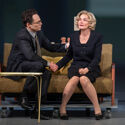
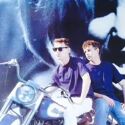
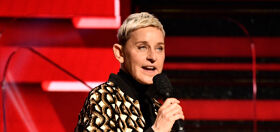
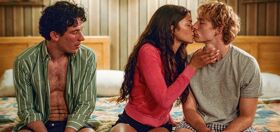

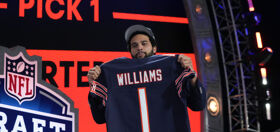
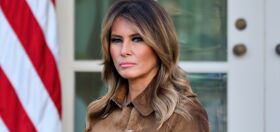











Doctor Benway
Nice interview. Too bad the journalist wasn’t reallt interested in anything but sex. I would have like more personal questions about Araki’s career, how «Mysterious Skin» changed everything about the way he was seen by his pairs, how this show looks like what he wanted to do 20 years ago with «This Is How The World End»… i would have like someone who really knew and was really interested by Araki, not somr wannabee Queerty guy who is just «there’s a lot of sex, lol».
socaliscorpio
this show sounds sooooo good ! I can’t wait
Curtispsf
The actor who plays Ford, Beau Mirchoff, plays him kind of campy despite Ford being straight. He set off my gaydar. And by the way, this series is fantastic.